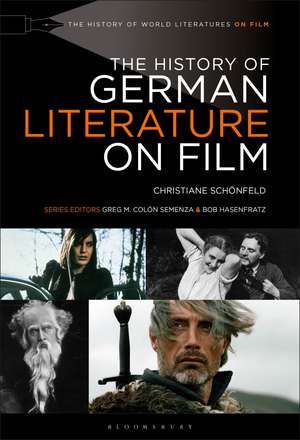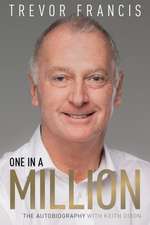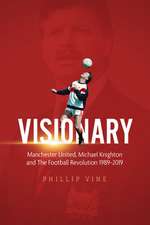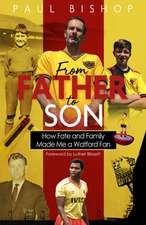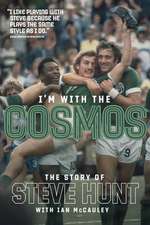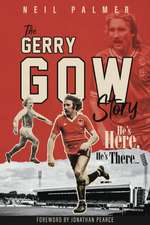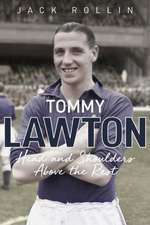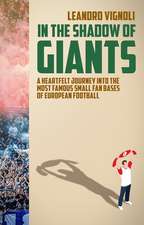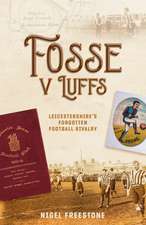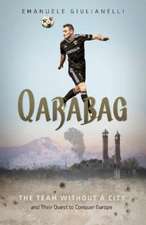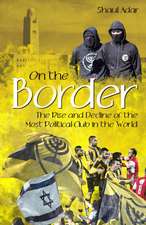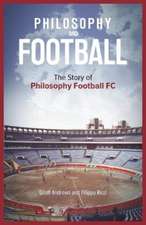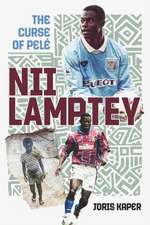The History of German Literature on Film: The History of World Literatures on Film
Autor Christiane Schönfelden Limba Engleză Hardback – 26 iul 2023
Preț: 734.50 lei
Preț vechi: 1147.51 lei
-36% Nou
Puncte Express: 1102
Preț estimativ în valută:
140.56€ • 152.63$ • 118.07£
140.56€ • 152.63$ • 118.07£
Carte tipărită la comandă
Livrare economică 22 aprilie-06 mai
Preluare comenzi: 021 569.72.76
Specificații
ISBN-13: 9781628923766
ISBN-10: 1628923768
Pagini: 720
Ilustrații: 50 bw illus
Dimensiuni: 152 x 229 x 46 mm
Greutate: 1.12 kg
Editura: Bloomsbury Publishing
Colecția Bloomsbury Academic
Seria The History of World Literatures on Film
Locul publicării:New York, United States
ISBN-10: 1628923768
Pagini: 720
Ilustrații: 50 bw illus
Dimensiuni: 152 x 229 x 46 mm
Greutate: 1.12 kg
Editura: Bloomsbury Publishing
Colecția Bloomsbury Academic
Seria The History of World Literatures on Film
Locul publicării:New York, United States
Caracteristici
Offers the first comprehensive chronology of adaptations of German literary texts by German and international filmmakers, and an in-depth assessment of the most significant films
Notă biografică
Christiane Schönfeld is Associate Professor and Head of German Studies at Mary Immaculate College, University of Limerick, Ireland. Her research on German-language literature and cinema focuses on a wide range of cultural representations and sheds light on their significance for the public sphere. Among her publications are books and articles on literary and visual cultures from the 19th to the 21st century.
Cuprins
List of Figures AcknowledgementsList of AbbreviationsIntroduction 1. The Beginnings of German-language Literature on Film (1897-1906)2. Early Transnational Narrative Cinema and the Impact of the First World War (1907-18)3. The 'Golden Age' of Silent Cinema: Literary Adaptation, Radicalism, and Censorship (1919-29)4. Literary Talkies: Sound and Internationalization (1922-32)5. The Other German Cinema: Exile and the Second World War (1933-45)6. A History of Abuse: German-language Literature in Nazi Cinema (1933-45)7. The Postwar Period: Reconstructions and Deconstructions (1946-61)8. Split Screens: Continuities and a New German Cinema (1962-89)9. The Walls Come Down: Entrepreneurs, Auteurs, and Art-house Cinema (1990-2021) BibliographyIndex
Recenzii
A most welcome and highly useful addition to scholarly literature on German cinema, Christiane Schönfeld's rich comprehensive history of adaptations based on German-language literary works takes the reader on a remarkable journey from the beginnings of cinema to productions of the present day. While spanning all of the essential epochs in a nation's film legacy, her synoptic study remains resolutely sensitive to adaptations of German works made around the globe as well as contemporary transnational and international productions. Her coverage, as one might expect, includes careful discussion of seminal auteurs and art films, but also grants equal attention to popular cinema in its various countenances, be they works in a variety of generic veins, children's films, Hollywood productions made by exiled directors, or more recent exercises in transmediation. At once acute in her formal analyses and sharply aware of socio-historical determinants and the conditions under which adaptations come into being, Schönfeld has written a major work, indeed the most significant study to date on German film and literature.
In elegantly crafted and eloquent prose, Christiane Schönfeld brings to life a history of German film adaptation spanning 130 years and ranging across film industries the length and breadth of Europe. The book expertly surveys existing work in film and literary history, while bringing fresh insights from extensive new research. This volume will be a point of scholarly reference for decades to come.
A magisterial survey and analysis of filmic adaptations of German literature in German film and television. Schönfeld's book opens a window on the ability of film to reflect and reflect on shifting cultural understandings of canonical (and less canonical) German literary texts over the course of the twentieth and twenty-first centuries. Essential reading for all those interested in the history of film - German or otherwise.
Christiane Schönfeld's detailed, informative, and exciting study deals with the productive relationships between German literature and film from the beginnings of film through the early 2020s. Many film productions are necessarily intertwined with their historical context, which they reflect and influence through attempts at manipulation, as with National Socialism or through criticism of the shortcomings in other times and systems. Traditions come into view that would have been forgotten-if it weren't for books like this one. Thus, this film history contributes greatly to our cultural memory.
In elegantly crafted and eloquent prose, Christiane Schönfeld brings to life a history of German film adaptation spanning 130 years and ranging across film industries the length and breadth of Europe. The book expertly surveys existing work in film and literary history, while bringing fresh insights from extensive new research. This volume will be a point of scholarly reference for decades to come.
A magisterial survey and analysis of filmic adaptations of German literature in German film and television. Schönfeld's book opens a window on the ability of film to reflect and reflect on shifting cultural understandings of canonical (and less canonical) German literary texts over the course of the twentieth and twenty-first centuries. Essential reading for all those interested in the history of film - German or otherwise.
Christiane Schönfeld's detailed, informative, and exciting study deals with the productive relationships between German literature and film from the beginnings of film through the early 2020s. Many film productions are necessarily intertwined with their historical context, which they reflect and influence through attempts at manipulation, as with National Socialism or through criticism of the shortcomings in other times and systems. Traditions come into view that would have been forgotten-if it weren't for books like this one. Thus, this film history contributes greatly to our cultural memory.
